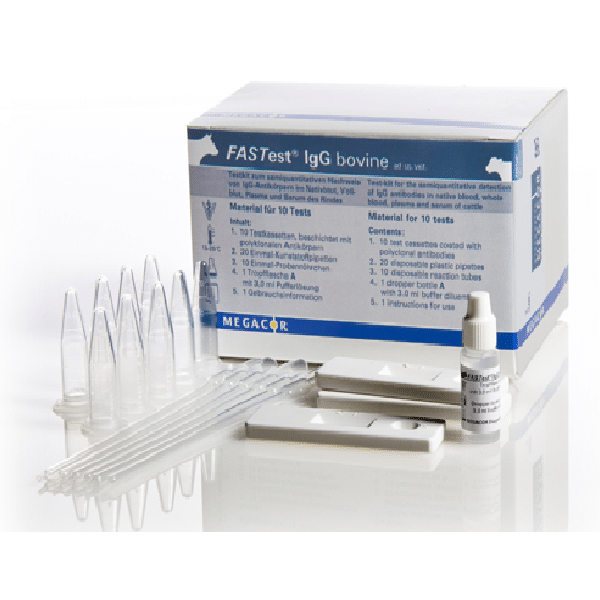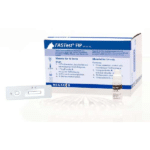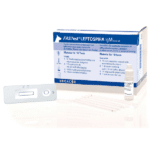Megacor Diagnostik – FASTest IgG – Box of 10
FASTest IgG bovine is a rapid immunochromatographic test for the qualitative detection of IgG antibodies (immune status) in whole blood, plasma or serum of cattle.
Delivery within 1 – 2 weeks
The immune system protects the body from invasion of various pathogens (antigens). A part of this protection, the humoral immune defence, is guaranteed by the formation of blood soluble antibodies (immunoglobulins). The immunoglobulins G (IgG, gamma globulins) belong to the antibody class G mainly directed against viruses and bacteria.
Due to the special placenta conditions, newborn calves often show no to hardly noteworthy IgG. Therefore, the most important base for an immunoprophylaxis is an adequate supplementation with IgG. This IgG transfer mainly is based on the ingestion and resorption of colostrum (adequate passive transfer) directly after birth up to maximal 24 h later. It turns out that both time of colostrum uptake and the amount of IgG taken up have an significant influence on the serum IgG concentration of the calf.
Failure of passive transfer (FPT) may be caused by inadequate suckling (reduced vitality, neonatal respiratory depression a.s.o.), way of colostrum application, very low levels of IgG in the colostrum, inadequate absorption of IgG or environmental stress. The consequences of an immune deficiency syndrome (IDS) are weak calves with a higher vulnerability for infectious newborn diseases like enzootic pneumonia of calves, diarrhoea (neonatal calf diarrhoea; calf scours) and other septicaemic diseases.
The increased incidence for cows (dystocia, metritis, mastitis a. s. o.) in the peripartal period is as high as in no other farm animal. Beside energetic shortage, especially the concentration of IgG (esp. IgG1) affects the immunity before and after birth. Latest investigations show following IgG1 concentrations in healthy cows with normal parturition and physiologic postpartal period:
– Ø 38 mg/ml at 7th month of gestation
– Ø 15 mg/ml physiologically low concentration peripartal
– Ø 30 mg/ml increasing from 4th month post partum
Hence, healthy cows show only then an undisturbed postpartal period after birth with or without caesarean sections when the IgG concentration is physiological or just under. If the intrapartal IgG concentration is already significantly decreased (< 15 mg/ml), an increased incidence of genital associated diseases will be seen in the peripartal period.
The optimal test time slot using FASTest® IgG bovine is between 24 to 48 h (max up to 7 days) post natum in calves and from 3rd to 7th day post partum in cows.
FASTest® IgG bovine enables the veterinarian on-farm and without any technical costs to confirm (FASTest® IgG bovine: IgG ≤ 10 mg/ml) or to exclude (FASTest® IgG bovine: IgG > 10 mg/ml) a suspicion for FPT/IDS in the cow as well in the calf. Hence, the immune status of cows as well as calves can be determined optimally during peripartal period. As a result, the rest time, delay time and the open days are reduced, also there is a clear reduction of calf losses.







